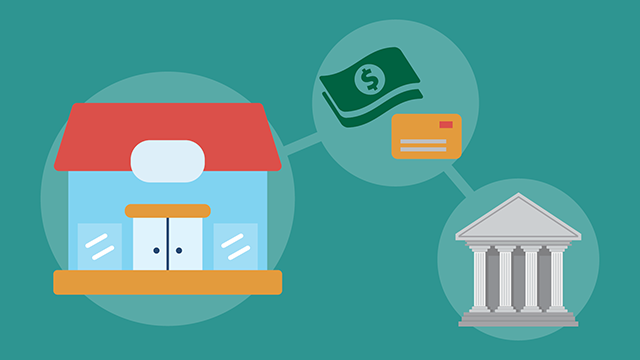The Role of Credit History in Getting Small Company Loans for Entrepreneurs
In the affordable landscape of entrepreneurship, safeguarding a tiny business finance typically rests on the critical element of credit history. These ratings act as a numeric depiction of a business owner's creditworthiness, affecting lending institutions' choices and the terms offered. A greater credit history can open doors to beneficial lending problems, while a lower score might provide substantial barriers. What precisely influences these scores, and exactly how can business owners strategically enhance them to improve their possibilities of protecting crucial financing? The solution to these questions hold the trick to opening possible development possibilities for small companies.
Comprehending Credit Scores
Debt ratings are critical mathematical depictions of a person's creditworthiness, working as a pivotal consider economic decision-making for lenders. These scores are stemmed from an extensive analysis of an individual's credit report background, including aspects such as settlement background, credit usage, size of credit rating, brand-new charge account, and kinds of credit rating used. Normally ranging from 300 to 850, greater ratings represent lower risk to lenders, while lower ratings indicate higher threat.
The computation of credit report ratings is performed by credit history bureaus utilizing exclusive formulas, with one of the most commonly recognized versions being FICO and VantageScore. Each design may evaluate factors somewhat in a different way, yet they all objective to supply a regular action of credit score danger. A solid credit report reflects the individual's dependability in taking care of debt, making timely payments, and keeping a healthy and balanced equilibrium in between credit scores utilized and offered credit history.
It is essential for people and service proprietors to recognize their credit history, as these figures can have significant effects past personal finance. Regularly checking one's credit history record, correcting inaccuracies, and adopting sound economic habits can considerably improve credit rating, thus boosting the individual's total monetary profile and creditworthiness.
Relevance for Lending Authorization
Comprehending one's credit history rating is foundational, as it plays a significant duty in the process of funding approval for tiny organizations. Lenders make use of credit rating ratings as a main statistics to evaluate the credit reliability of candidates.
In comparison, a reduced credit rating could indicate possible threat, leading lenders to either reject the loan application or impose more stringent conditions. This makes it crucial for business owners to be mindful of their credit scores standing, as it straight influences their capability to access capital. In addition, credit history offer as a standard measure that enables lending institutions to simplify their decision-making procedure, guaranteeing performance and consistency. As local business often need prompt access to funds for development and sustainability, preserving a durable credit report becomes crucial. Therefore, understanding and taking care of one's credit rating score is an essential part of preparing for loan applications and attaining service success.
Aspects Influencing Scores
Several elements add to the decision of a credit history, each playing a critical role fit an individual's credit score account. Amongst these, repayment background attracts attention as the most prominent, mirroring the timeliness and consistency of financial debt repayments. Lenders very closely inspect this element to examine monetary reliability. Similarly, the amounts owed, or credit score utilization, dramatically effect ratings. A high proportion of used credit score to readily available credit score can recommend monetary overextension, negatively affecting credit reliability.
Size of credit rating likewise factors right into credit rating computations, with a much longer credit report normally seen a lot more positively. This metric gives insight into the individual's long-term financial actions, supplying lenders a wider perspective on their credit rating management abilities. In addition, the kinds of credit report being used are taken into consideration, as a mix of credit report accounts, such as rotating bank card and installment fundings, can demonstrate the capability to take care of various official site monetary responsibilities.
Finally, recent credit history inquiries might influence scores (pre approval student loans). Regular applications for new credit rating can indicate financial distress, therefore negatively influencing the score. Each of these components is crucial in the thorough evaluation of a credit history, influencing an entrepreneur's capability to secure a bank loan
Improving Your Credit Score
Boosting one's credit scores score is comparable to supporting a garden; mindful interest to essential areas can generate substantial renovations. Settlement background makes up a substantial portion of a debt rating; therefore, establishing up automated reminders try here or payments can help keep uniformity. High credit scores usage proportions, or the amount of credit history used loved one to the debt limitation, can negatively impact scores.

Lastly, keeping older credit accounts can favorably influence the typical age of debt, which is one more element in scoring designs. While new credit scores queries need to be lessened to stay clear of short-term rating dips, responsible credit management with time will normally result in rack up renovation, hence boosting qualification for favorable small company financing terms.
Alternative Financing Options
Browsing the globe of little business financing frequently requires discovering alternate choices beyond standard small business loan. Business owners with less-than-ideal credit report might locate these alternatives not just extra accessible yet likewise tailored to their special organization needs. Among the most preferred options are online lenders, which have multiplied recently. These platforms commonly use faster approval procedures and more flexible terms than traditional banks, frequently considering elements past credit rating, such YOURURL.com as company performance and capital.
In addition, microloans, usually supplied by not-for-profit organizations, cater to little companies and start-ups. They supply smaller loan amounts with reduced interest rates, making them excellent for business owners who need limited funding.
Invoice financing and vendor cash loan are also worth taking into consideration. The previous entails offering exceptional invoices to a lender at a price cut, while the latter offers a bear down future sales. Both options can enhance cash money circulation without the rigorous credit score needs of traditional finances.
Verdict

These scores are obtained from a thorough evaluation of a person's credit scores background, incorporating elements such as repayment background, credit score usage, size of credit score history, brand-new credit score accounts, and kinds of credit score made use of (pre approval student loans). A strong credit report score reflects the individual's dependability in handling financial debt, making timely settlements, and preserving a healthy and balanced balance between credit rating made use of and available debt
